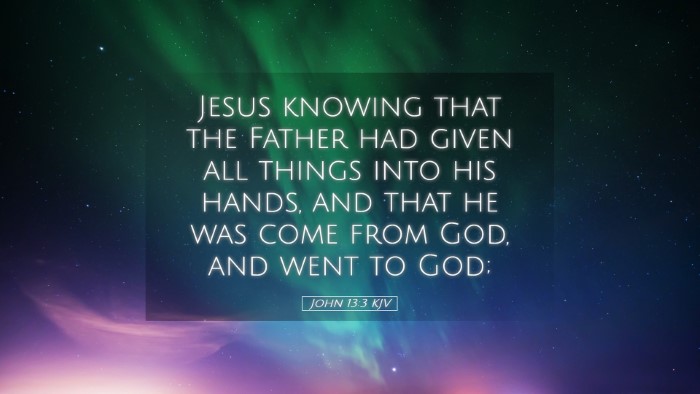Commentary on John 13:3
John 13:3 states: "Jesus, knowing that the Father had given all things into his hands, and that he was come from God, and went to God." This profound verse opens the final intimate moments of Jesus with His disciples before His crucifixion, shedding light on the nature of His mission and His divine authority. The insights gleaned from public domain commentaries provide a deeper understanding of the verse and its implications for Christian theology and discipleship.
Divine Authority and Sovereignty
Matthew Henry emphasizes the significance of Jesus knowing that "the Father had given all things into his hands." This authority was not merely a transient power; it was indicative of His divine appointment and the fullness of His ability to fulfill the redemptive plan. Henry notes that this awareness of His authority compelled Jesus not to exalt Himself but to serve others, demonstrating that true authority lies in humility.
Albert Barnes expands this point by highlighting how Jesus' knowledge of His origin and destiny influenced His actions. He underscores that Christ came from the Father and was destined to return to Him, presenting His earthly ministry as a fulfillment of a divine mission rather than a quest for personal glory. This knowledge empowers believers to understand the purpose behind Jesus' actions, including His somber act of washing the disciples' feet shortly after this declaration.
Understanding Jesus' Mission
The context of John 13:3 reveals the heart of Jesus’ mission. Adam Clarke elaborates on the significance of "he was come from God." This phrase encapsulates the incarnation of Christ, affirming His identity as the Son of God who took on human flesh. Clarke emphasizes that this grounding in divine origin is crucial for understanding Jesus’ authority and the inextricable link between His identity and His mission.
Furthermore, Clarke notes the implications of "and went to God." This speaks to the hope of believers, as it alludes to Jesus' imminent ascension and the promise of eternal life. His ministry on earth, filled with acts of service, was always in light of His return to the Father, shaping the narrative of redemption throughout the Gospels.
Theological Implications
- Divine Omniscience: Jesus’ knowledge is profound, indicating His omniscience as God incarnate. He was acutely aware of His authority and the impending sacrifice He was to make.
- Servanthood as a Model: The ensuing narrative of Jesus washing the feet of His disciples serves as a model for servant leadership in the Christian community. As Henry points out, Jesus’ authority led Him to humble himself, challenging societal norms about power and leadership.
- Redemptive Vision: Understanding Jesus’ divine origin and mission encourages believers to view their lives under the scope of God’s redemptive plan. Barnes notes that the context of this passage provides a framework for living out one’s faith in service to others.
- Eschatological Hope: Clarke's observation that Jesus returns to the Father reinforces the hope of resurrection and eternal life for believers. The reality of Jesus’ return sets the stage for the Christian understanding of eschatology.
Practical Applications
As pastors and theologians reflect on John 13:3, they are prompted to consider how these insights affect daily ministry.
- Embrace Humility: Leaders are challenged to embody the spirit of servanthood that Jesus exemplified. The understanding of authority as rooted in humility is transformative for church dynamics.
- Teach on Identity: The identity of Jesus as both fully God and fully man provides a foundation for Christology and encourages believers to grasp their identity in Him.
- Encourage Servanthood: Implementing teachings on servanthood in the church encourages practical applications of faith in community life.
- Focus on Eternal Perspective: Emphasizing the eschatological implications of Jesus' ministry, as highlighted by Clarke, propels the church toward a forward-looking faith that anticipates eternal life.
Conclusion
John 13:3 is a critical verse that encapsulates Jesus’ understanding of His divine authority, mission, and the nature of His relationship with the Father. The combined insights from public domain commentaries reveal profound theological truths that inform Christian practice, identity, and hope. Through humble servanthood, a grasp of divine authority, and the anticipation of eternal life, believers are called to live in a manner that reflects the character and mission of Christ.


